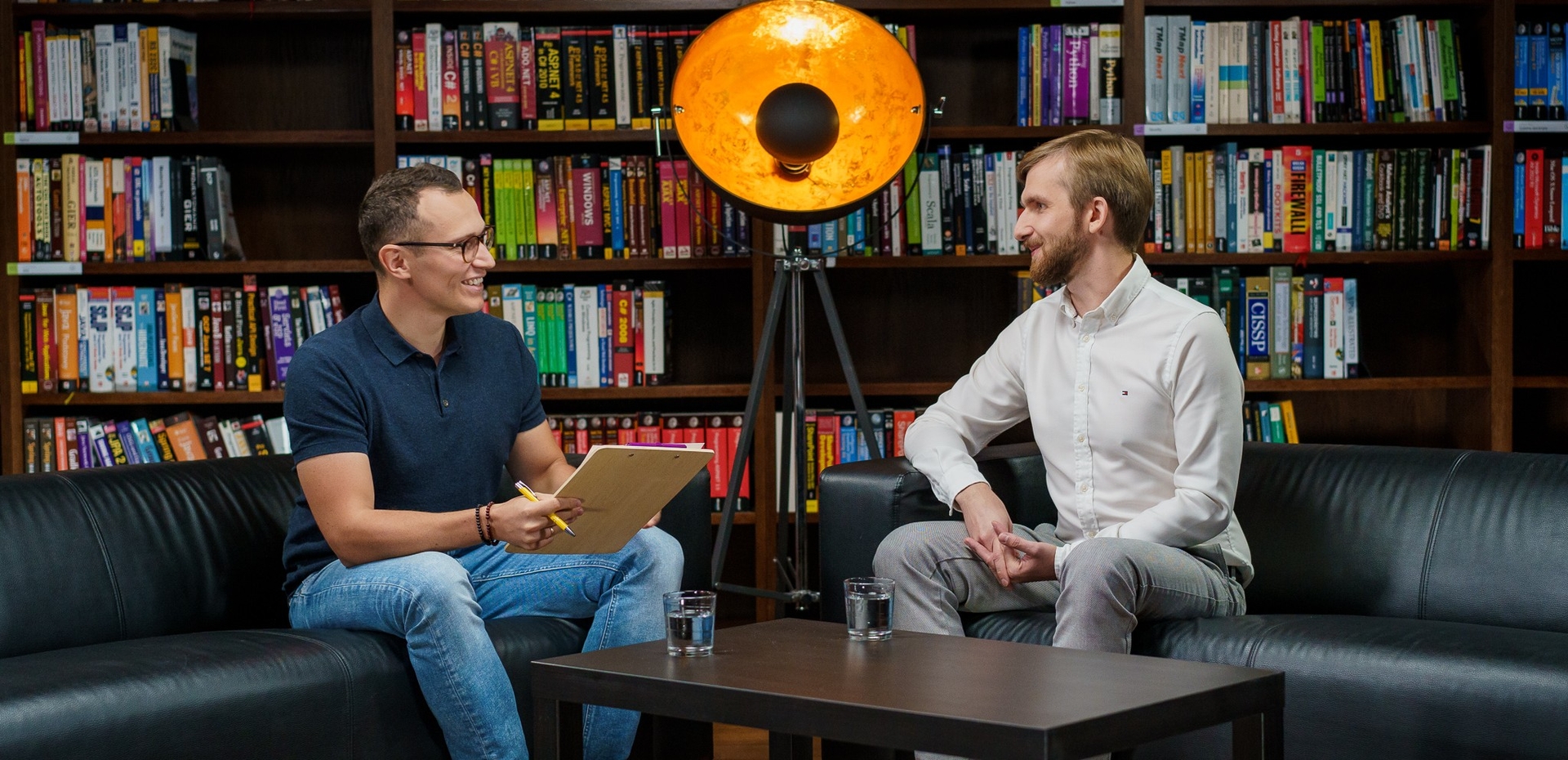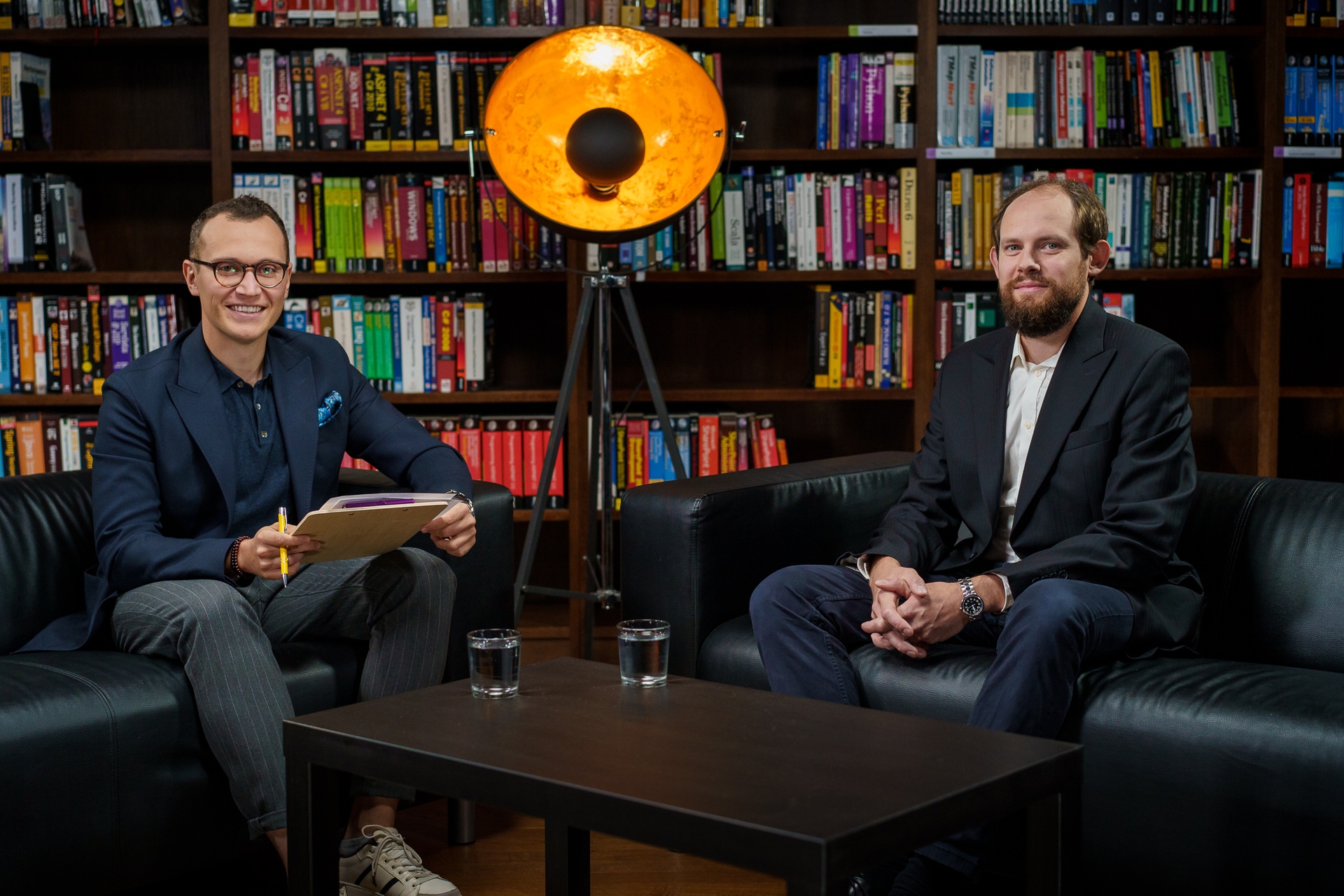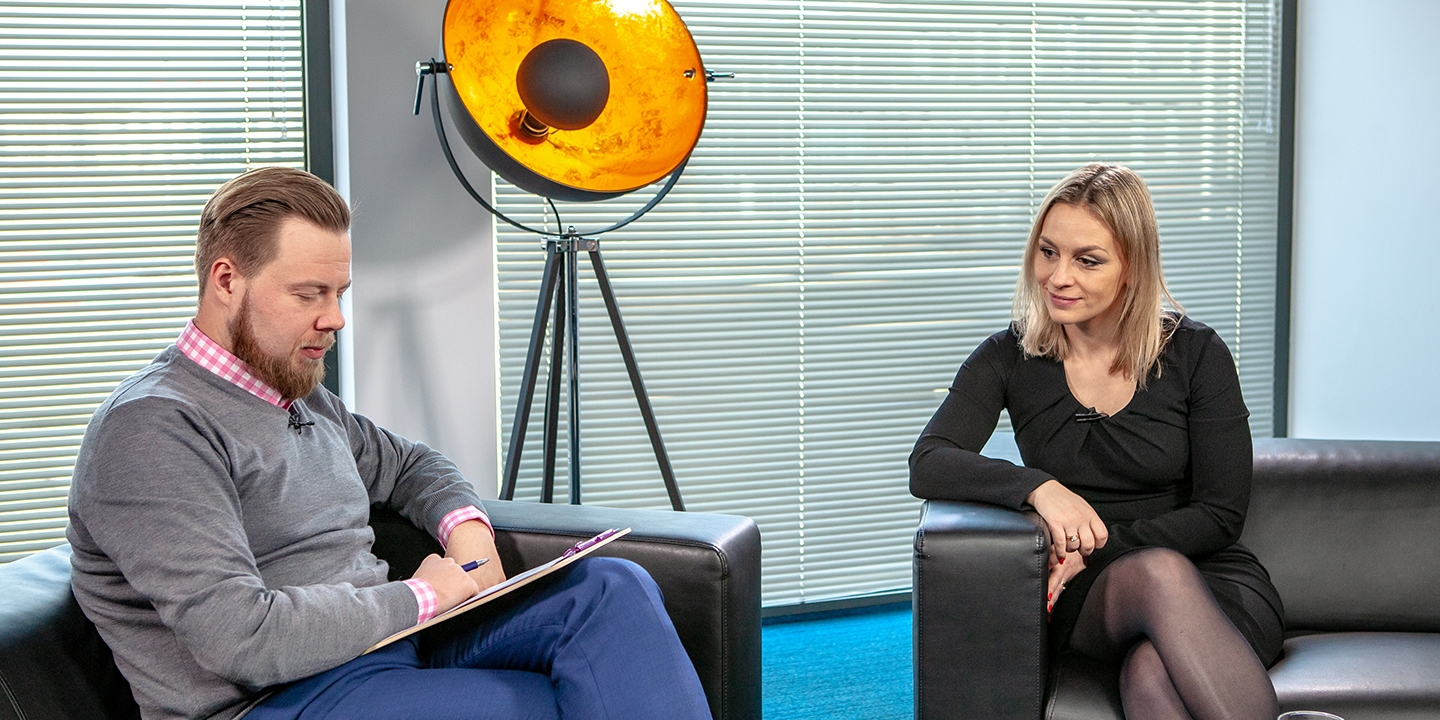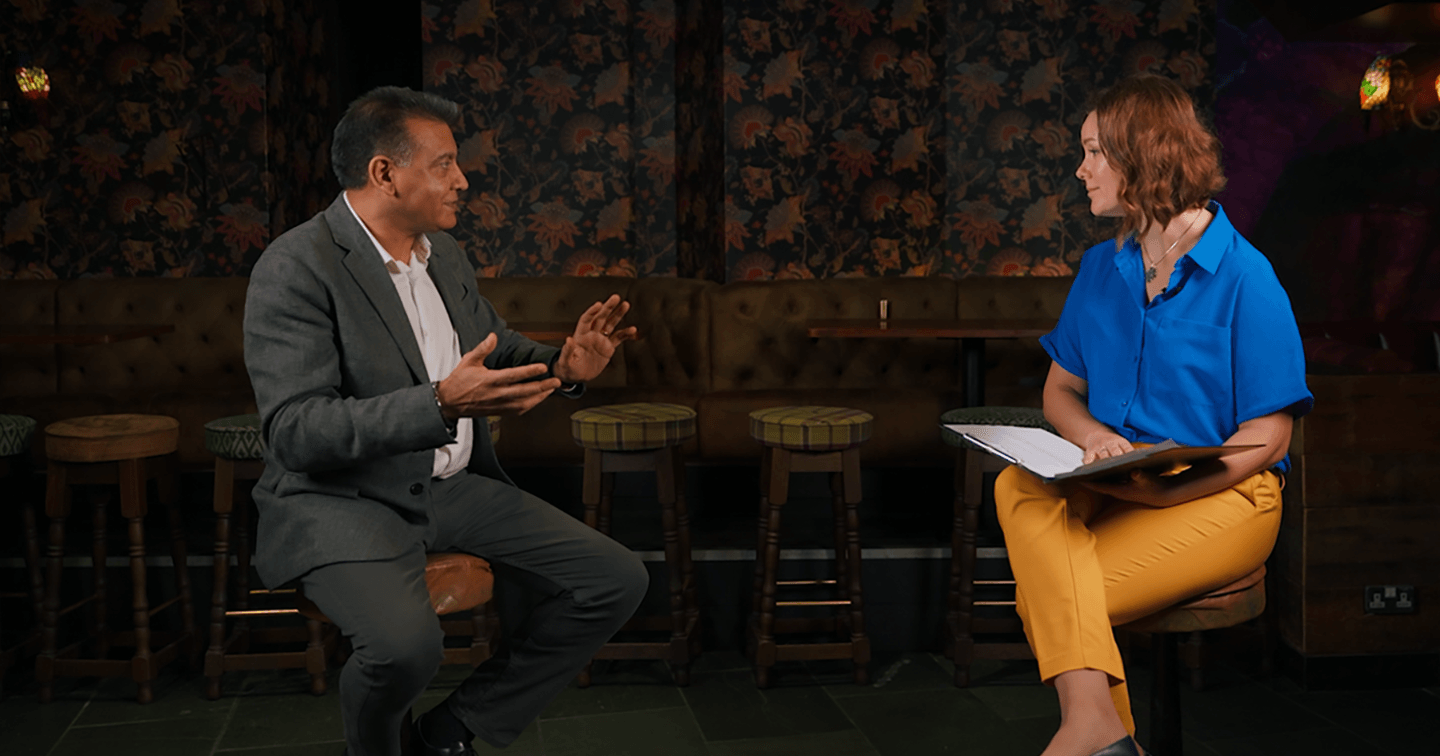- Insights hub
- /
- Operational excellence in...

Operational excellence in times of uncertainty with Krzysztof Karolczak
- DetailsAbout the talks
- TranscriptTranscript
- Resources2 Files
Operational excellence in times of uncertainty with Krzysztof Karolczak
Michał Grela
Relationship Manager at Future Processing
Michał Grela and Krzysztof Karolczak discuss how operational excellence is being disrupted by technology during times of pandemic uncertainty.
Business will always identify areas that with opportunities for improvement. Thought leadership and continuous improvement are key to achieve operational excellence, and it’s about a proper mindset instead of a set of activities that brings you closer to the goal.
But like every other process, operational excellence it’s being disrupted by technology. Things got even more complicated now, during times of pandemic disruption and uncertainty.
Our Guests:
Krzysztof Karolczak is the Founder and Head of Growth at Inwedo, who builds software for world changers. For 15 years associated with the IT industry, supports web and mobile application projects for both startups and companies from the enterprise sector, where he acts as an advisor, mentor, co-founder or investor.
Michał Grela is Future Processing’s Relationship Manager, working within the marketing department to establish and nurture relationships with prospective customers and expand the company’s network of contacts. He strongly believes that business is about people and that, at the end of the day, it’s all about Human-to-Human rather than Business-to-Business.
Michał Grela (MG): Hi, my name is Michal and I’d like to welcome you to get another episode of IT Leadership Insights by Future Processing. Today, we’re gonna focus on operational excellence in times of uncertainty. Business will always find areas of improvement for leadership and continuous development are fueling the disruption and are key to achieve operational excellence. But it’s rather about the proper mindset instead of a set of activities that will bring you closer to the goal. But like every other process is being disrupted by technology. The recent EI report on operational excellence states that a rigid, linear and expensive process is being replaced with a collaborative, iterative and highly automated approach. This approach though is enabling companies to be more agile, more customer centric, and to lower costs. But things are more complicated now during times of pandemic and the uncertainty that’s with us for a good few months now. So let’s discuss that with our guest today. Kryzystof Karolczak, founder of Inwedo. I’m very happy to have you here. Thanks for, for joining us. Would you be so kind and introduce yourself and your company, please?
Krzysztof Karolczak (KK): Michal thank you for the introduction and invitation here. I’m Krysyztof Karolczak and I’m a founder of Inwedo and consulting agency and a software house helping companies to scale. And this operational excellence is close to my heart, because I’ve been wearing a process mindset for the last dozen of years, thinking about how we can improve processes in the ongoing world. And the times are very interesting right now, especially with all the uncertainty that is happening around the world.
MG: So a very relevant topic, then let’s jump right to it. How do you personally understand operational excellence and why should we try to achieve it in the first place?
KK: Operational excellence is one of this triage of value domains. That’s been around with business for probably 30 or 40 years. It can be companies aim at either operational excellence or customer intimacy or product leadership. So, so that’s, it’s still relevant in the current times, but the, the meaning of operational excellence defined as trying to lower costs is I think not relevant anymore. We live in a world where we, we used to live in a world where the processes were quite constant and you could iterate a few 1000 times looking and optimizing a certain process without an environment changing. Now, nowadays we see more and more disruption either because of the current corona crisis or because of the speed that the technology adoption of technology is driving companies to, to, to innovate at a pace that was never seen before. So I believe operational excellence is more than just minimizing cost, or we have to define cost product because those are costs not only financial, but also taking into account environmental impact, or also the pace at which you can adapt to new processes and new realities.
MG: Definitely the velocity of technology and disruption is ever more increasing. And I definitely agree that it it’s not about the cost itself. It’s about the sustained growth. And when I was thinking about it, preparing for this conversation, I came across this statement that of course, every organization, every company is improving, but the majority of them are improving at the same pace. And if you’re in the part of the market, in the chunk of the, of the market, where you improve at the same pace as your competitors are, then you’re no different and there’s nothing distinguishing you from your competition. So you have to improve on a pace that would set you apart. But when thinking about how to do it, are there any set of rules to follow? What crosses your mind, what to focus on when it comes to increasing this level of operational excellence?
KK: Yeah, I think the keyword here is context, and I believe that now more than ever companies should focus on propagating context and making sure that the decision-making process is handed the people that are closest to the, to the action. So, so if you equip your teams with, with context, then people in those teams are more able to do conscious decisions which means that we are actually driving decision-making down in the organization schemas. And that means that it’s, it’s people that are on the front lines that should be making a majority of decisions because they’re closest to the context. And then we have this wonderful technology tool chain that that helps teams and people to spread the context. So it’s no longer I think we’re moving out of this old silo era where, where organizations were divided into rigid structures that had very limited information flow between them. But we’re moving into organizations that collaborate real time with tools like slack, with tools like notion, which is a tool for storing knowledge and many other collaborative tools that actually help to move across departments, across teams and, and decision making power to people are closest to, to, to that reaction.
MG: So if I understand that correctly, your recipe would be rather not to follow any methodologies or like mainstream puffs, but rather go top down when it comes to decision-making within your organization, and then empower people that are on the front line to actually drive the pace of development of the whole organization.
KK: Yeah, that’s, that’s great. That’s, that’s, that’s a path I was following personally. And I believe in empowered teams, I believe that the teams that work close in close, close hand in hand with, with their stakeholders, they become partners and for the stakeholders and such a team should have all the tools to be making conscious decisions, which means, which gives a nice challenge for technology, how to provide information in such a way that it’s not overloading those teams. The context is actually crucial here because context doesn’t mean let’s give all the people, all the information as much as possible because we already live in an information overload world. Let’s give those information in a meaningful, smart way. And that’s something that goes beyond our typical software development. This, this opens the whole domain for business intelligence and AI analysis, and trying to filter the relevant information, which is a challenge that we will be seeing more and more.
MG: That’s actually very spot on change is better controlled when when happening slowly, and one step at a time, there’s the saying you have to eat an elephant one bite at a time. So improve one, one idea at the same time, that’s a very right approach. And I really liked what you said, that it boils down to two people and at the end of the day, it’s rather about people instead of processes and their mindset and approach. But you’ve mentioned that technology plays a vital role in, in this process as well. And we all know that technology is truly is a catalyst of operational excellence, but when done wrong, it can become an obstacle. You’ve mentioned quite a fast variety of tools that you can use, but don’t people on daily basis, have a feeling that technology is rather disrupting them in a negative way because of the overload, as you’ve said.
KK: Well, I guess this is a challenge for everyone personally, in saying, how do we lead a technology hygienic life? I guess this is something that Leslie said, well, being is a topic that is a hot topic right now. And all sorts of mindfulness practices are a reaction to our very overloaded society. So that’s, that’s something I would take take apart because then we’re, we’re coming back to people again, right? I think that organizations are evolving now, and companies are evolving now to become safe places for people to show up fully at work. And that’s, that’s something that’s been driving me for years, and we want, I want to build organizations that actually allow people to come fully present at work, feel safe. And within this circle of safety, they can basically flourish their, their creativity can converge and they can focus on making conscious decisions. And, and this is something we share with Future Processing. I know that the focus on people with something that actually drives our partnership forward, because we have the same idea on, on how much people’s creativity is, is meaningful. When, when creating anything creating, doing in any creative process.
MG: Definitely, definitely. We share this mindset, but focusing on, on the tech bit, agreeing that the people part is, is the most important, but it’s a building block that you, that you use, but you have to take it from the how technology drive drives adaptive, adaptive operations and operational excellence. That’s that’s my, that’s my next questions. That’s my next question. Apologies. Do any examples come to your mind? Or what would you say?
KK: Yeah so we have the whole growing area of business intelligence, which tries to get visualized data in the hands of people in real time. And real time is the key factor here. I believe that we are very much moving away from data that is delivered in monthly bits and pieces reports that come already outdated. I think that the pace of the current world, and then accelerated by the pandemic means that many organizations should adapt real time reporting, or at least we saw, and we helped our customers to move from, for example, monthly or quarterly reporting into weekly. Yes.
MG:Weekly yeah.
– And, and that’s been a whole lot of difference because if you can make decisions with just six or seven days overhead, that means that you’re, you’re much more likely to get things spotted before they become an issue in the company or a bottleneck in the company.
MG: Definitely capturing data and analyzing data. It’s, it’s, it’s one of the way to, to harness technology when it comes to operational excellence. But also this top-down initiative as you’ve said when it comes to business intelligence is also a vital, vital part making. I think that I would dare to say that you cannot achieve operational excellence without being able to make decisions in real time and based on, on real data, that’s not biased. So data-driven decision-making is definitely a big part of it. Do you have any other examples in mind?
KK: I think many organizations saw that remote work was a disruption, but then, then after a month, the operations should resume as normal or even sooner. And then it means that without being able to host in place, in person meetings, we got through a phase, I guess, of meetings that, that had more and more people on it because it was very easy to, to conduct online meetings. And, and then from, from that, a new structure for many companies emerged where those decisions are made on meetings, but also very often synchronously through collaboration on, on either documents or, or through chats. And, and this, this actually created a new, new ways of, of making decision has probably accelerated the decision making process as well. So, and, and I feel that this structure is more malleable and it will help companies to adapt at a quicker pace to, to changing of the structure of their organization, for example. So I believe that there’ll be more ad hoc groups that will have a decision to, to do or to make, and those groups will form and dismantle after, after the decision or a project is finished. So, so this is my perception in the near future that we’ll see more malleability in, in larger organizations as well.
MG: Now, definitely affects operational excellence. Well, thanks for sharing that, that was, that was really valuable. Were I to sum it up, I would say that based on what we’ve just discussed, operational excellence is achieved when every member of an organization can see the, the flow of value to the customer, but seeing it however is not enough. And of course, every team member should actively act to improve the value and move up the value chain. And the closer you are to the front end, to the customer, the more responsibility for achieving this operational excellence lies on your hands, on your shoulders, as well as it’s, as it’s delivery. I think that, that we can agree that operational excellence is a journey that of course involves applying the right tools and processes but at the end of the day, it comes to, to people, mindset and attitude and making people empowered and motivated helps that achieving that goal.
KK: Very well said. I think, I think technology will be a factor that will cross-pollinate context between people and then that this is what I, what I see as the greatest value of technology. It should just unlock the knowledge that is stored in silos and propagate this relevant people. And then those people can make the informed decisions too, that will drive whole organizations forward.
MG: Brilliant. Thank you. That was really informative. Thanks, Krzysztof. And thank you, our viewers for watching get another episode of IT Leadership Insights by Future Processing, if you’ve liked it, and you’ve found it useful, please don’t hesitate to share it. And please do drop us a line if you’d like to have another topic covered in one of the future episodes of IT leadership insights. Thank you.
INSIGHTS
Check similar insights
Contact
Get in touch
Have any question about specific material?
Let us know!









